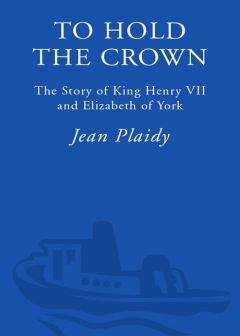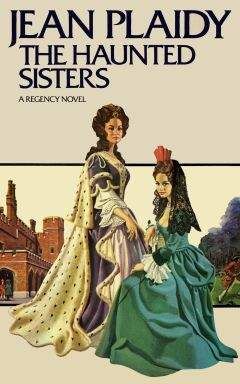Jean Plaidy - Mary, Queen of France: The Story of the Youngest Sister of Henry VIII

Помощь проекту
Mary, Queen of France: The Story of the Youngest Sister of Henry VIII читать книгу онлайн
“It is two years away, sister. Dismiss it from your mind. In two years’ time you will understand more than you do now. You will be reconciled to our fate. Believe me, a great deal can happen in two years. Why, at one time I repudiated Kate … then, when I was King, I married her.”
Mary stamped her foot. “Henry, stop treating me as a child.”
He smiled at her as indulgently as ever, but there was a sharp note in his voice. “Remember to whom you speak, sister.”
“Henry,” she said vehemently, “it is because I never want to leave England. Let me marry in England. Greenwich … Richmond … this river … this King … these I love.”
He patted her hand. “Methinks,” he said, “that I am over-soft with you, sister. It is because of the great love I bear you. I no more want you to leave us than you wish to. But I can no more keep you back than I could have kept Margaret.”
“You did not care that Margaret went.”
“I had no wish for her to go to Scotland. I love not the Scots.”
“And you love these Flemings, these Spaniards?”
“My wife is a Spaniard, sister, remember. Oh come, smile. Do not grieve about tomorrow when there is so much to make you smile today. I will tell you something. We will have a masque to beguile the time. You shall help me plan it, eh? And it shall be in your honor. How is that?” He turned and called: “Brandon! Compton!”
And it was when they were joined by these two that he noticed the look which Mary bestowed on Charles Brandon. She was too young to disguise her feelings and Henry believed he knew why she had suddenly become so eager to avoid the marriage with Charles of Castile.
So she had cast her eyes on Brandon. Well, Brandon was one of the most attractive men in his Court … the most attractive, with one exception. They were so much alike that when they wore masks one was often mistaken for the other. They could have some good sport with this resemblance.
Oh yes, he could quite understand the effect a man like Brandon would have on an impressionable girl.
It was nothing, though. A passing fancy. This happened with young girls now and then.
Brandon at the moment was unattached. It might be well to deal with that matter. When he had time he would remember. In the meantime he must keep Mary amused, for he was too fond of the child to be able to look on unmoved when she was unhappy.
She would have to go to Flanders or Spain at some time, but that time was not yet. He had to remember that she was a young girl with a young girl’s fancies.
All the same he would do something about Brandon.
Henry’s friendship with Charles was greater than ever during that year, and the King appointed his friend Keeper of the Royal Manor and Park of Wanstead and Ranger of the New Forest. Instead of Squire of the Royal Body he was now Knight of the same, and they were rarely out of each other’s company.
One winter’s day when they were returning from the hunt together Henry said to Charles: “I should like to bestow some title on you, Charles, and I have been turning this matter over in my mind for some time.”
“Your Grace has been so good to me already …”
“It gives me pleasure to honor my friends. But you who are so often in the company of your King should have a title. It has been brought to my notice that Elizabeth Grey is the sole heiress of her father, John Grey, Viscount Lisle. I propose to make the girl your ward. Then it is up to you, Charles; marry her and you will take over the title. Viscount Lisle! What think you?”
“I thank Your Grace.”
Henry slapped his friend’s arm. “Go to,” he said. “You have our leave to visit the girl. She has more than a title to offer you, Charles. There’s a fortune to go with it. Now go, and come back and tell me you have become Lord Lisle. It grieves me to see you without a wife.”
Charles renewed his thanks to the King and left Court, wondering whether Henry was more astute than he had imagined. But perhaps no great shrewdness was necessary. Mary, with her passionate vehemence, could so easily betray her feelings. Doubtless she had already done so to her chief lady-in-waiting, Lady Guildford, who had been her governess since her childhood; could it be that Lady Guildford had thought it her duty to inform the King?
If he were to prove that he was not to blame for the Princess’s passion, he must obey Henry’s command with speed. If there had been a hope of marrying Mary he would have worked with all his might to bring about that desirable end; but there was not. Why, he thought, even if she were not affianced to Prince Charles, she would never be allowed to marry plain Charles Brandon; and if Henry thought he had raised his eyes so high he would feel it imperative to slap him down. Who knew, that could be the end of the brilliant career which was opening out before him.
He arrived at the home of Elizabeth Grey to find a mansion which was an appropriate setting for a rich heiress. All this land would be mine, he thought. This house, a fortune, a great title. I trust she is beautiful.
He waited in the long hall for her servants to tell her of his arrival, but while he paced up and down he was thinking of Mary, picturing her fury when she heard that he was married. He murmured: “Mary, my Princess, it is useless. You would have had us both in the Tower.” She would answer: “Willingly would I endure imprisonment in the Tower, for I would rather be dead than married to Charles.”
She was a wild creature; she had escaped the discipline which had been enforced during the lifetime of her father; the restrictions Henry VII had imposed on his children could only make them more eager for freedom. The same was true of Henry, and, he was sure, of Margaret. They were headstrong people by nature; they called themselves Tudors but they had inherited none of the caution of Henry Tudor; they were Plantagenets, every one of them—adventurers who would demand of life what they wanted, and use all their tremendous willpower to acquire it.
He would have to explain to her that it was at the King’s command that he had married Elizabeth Grey. She would despise him, stop loving him; and perhaps that would be as well for her peace and his.
There was a commotion at the head of the great staircase, and he heard a shrill, imperious voice saying: “Must I see this man?”
“My lady, you must. It is the order of the King.”
Then she was coming down the stairs, lifting her skirts almost disdainfully; her little head high, as she looked straight ahead, walking regally like a queen in her palace. Brandon was astonished, for she could not be more than eight years old.
She stood before him and held out a hand. He bowed his tall figure a very long way and looked into her face. She was no beauty and her expression at this time was far from agreeable. Her governesses stood a few paces behind her.
Charles straightened up. “I would speak with the Lady Elizabeth in private,” he said.
For a moment the child’s face betrayed her fear; then she said: “Very well.” And to her attendants: “You may wait in the winter parlor.”
She was both imperious and apprehensive, as though she recognized that she was a very rich little girl, and that riches could mean power in some ways, disaster in others; Charles, who was fond of children, felt a little sorry for her.
When they were alone he said: “You know the King has commanded me to come here?”
“I know it,” she answered.
He took her hand and led her to a chair on which she sat while he drew up a stool and placed it opposite her, before seating himself.
“You should not be afraid of me,” he assured her.
“I trust not,” she answered.
“Then why does my presence worry you?”
“Because I know why you have come. The King has chosen you to be my husband.”
“And you like me not?”
“You are very old, and I do not want a husband.”
“It is because you are so young that you think me old. It is also because you are so young that you do not want a husband.”
“And it is because I have a large fortune that you want me for a wife.”
“My dear child, the King commanded me to come here. I did not seek this any more than you did. Shall we say we are victims of circumstances?”
“I am happy here. I have many people to care for me. My father is dead.” Her lips trembled. “But I have others to love me.”
“Do not be downcast. You are over-young to marry. You could not have a husband for at least five years.”
She looked relieved, and suddenly laughed in a merry fashion. “In five years,” she said incredulously, “why, by then …”
“I shall be quite ancient and beyond being a husband!” He laughed. “Not quite, my lady. But it may well be that in five years’ time you will have a different opinion of me from that which you have today.”
She was unconvinced, but clearly she did not find him such an ogre as she had feared he might be.
“The King has made you my ward,” he told her; “and as your guardian I must stay here awhile and make sure that you are being well cared for. It is the King’s wish that we should become betrothed to each other. But do not be alarmed. I do assure you that this will be only a simple ceremony; and we shall not be married until you are at least thirteen years old, which must be quite five years away. Come, show me the house and introduce me to your attendants. I promise you that in a few days you will recognize me as your friend.”
The little girl rose and put her hand uncertainly in his.
She said: “And if, when the time comes, I do not want to marry you …”
“Then I shall not force you to do so.”
Elizabeth Grey was clearly happier than she had been since she had heard that by the King’s command she was to become the ward of Charles Brandon whom Henry had chosen to be her husband.
As he learned the extent of Elizabeth’s wealth, Charles could not but feel gratified. Henry must indeed think highly of him to place such a prize in his hands. He was glad that the child was too young for marriage, because he would have time to prepare her for it; and since he could not have Mary, she would be a very good substitute.
She was an ungracious little creature whose confidence was not easily won, but he was sorry for her. Poor child! To lose her father and then suddenly find herself, on account of her position and wealth, offered to a stranger!
She would find that he was no brute. But how to convince her of this?
An incident occurred a few days after his arrival which made the little girl change her mind.
She and Charles were riding together through the countryside with a few of their attendants when, passing a river, they heard cries and, pulling up, saw a child of about three or four years struggling in the water.
Charles was the first out of his saddle and, striding into the river, grasped the child and brought her to the bank.
His handsome clothes were ruined by the water and the child was so still that she appeared to be dead.
“She is not dead,” cried Charles. “We must take her back to the house as quickly as possible. Give me your cloak, Elizabeth, and we’ll wrap it about her. Everything I have on is saturated.”
When the child was wrapped in the cloak, Charles remounted, and, holding her in his arms, took her back to the house. There he and Elizabeth looked after the little girl, who was suffering from shock and chill; but apart from this no harm had come to her and in a few days she was well.
When they questioned her she was able to tell them that she had neither father nor mother. Charles made inquiries in the village, where he learned that she was an orphan only tolerated by an aunt who had a brood of her own and did not want her. It was clear that this callous woman was far from grateful to Charles for saving the child.
“What shall we do with her?” asked Elizabeth.
Charles laughed. “I’ll not have made such an effort in vain. I came here to find one ward. It seems I have found two. I also have two daughters. I am going to send this child to be brought up with them.”
So Elizabeth found clothes for the child, who followed Charles wherever he went, rather to his amusement.
Elizabeth, who was not demonstrative and did not win the child’s affection as Charles had done, watched solemnly. She knew that Charles took pleasure in the child’s devotion, largely because he had saved her life.
Elizabeth said: “You are a kind man, but I think a vain one.”
“At least,” he answered with a laugh, “I have won some small approval.”
Before he left for Court he had persuaded her to make a contract of marriage with him, assuring her that this contract could be broken if, by the time she was of a marriageable age, she had no desire to continue with it.
He took with him the child he had rescued, and placed her with his own daughters, where she was to be cared for as one of them.
He was not displeased with that adventure. Now that he had the marriage contract he knew that Henry would create him Viscount Lisle; he would have the title in advance, and he had not to think of marriage for another five years.
When he returned to Court Mary demanded that he meet her secretly in the gardens of Greenwich Palace.
She turned on him angrily when he came to her. “So you are affianced to Elizabeth Grey!”
“At the King’s command.”
“Is it fitting that a man should have a wife found for him? I should have thought any worthy of the name would have chosen for himself.”
“I am not yet married.”
“But affianced … for the sake of her money and title, I understand.”
“For the sake of the King’s pleasure,” he retorted.
“And when does this marriage take place?”
He took her by the shoulders and shook her a little. “My Princess,” he said, “I am affianced to a girl of eight. It will be five years before we can marry. A great deal can happen in five years. When I entered into this contract I was playing for safety.”
She began to laugh suddenly, holding up her face to his. He kissed her and the passion in her delighted and alarmed him.
“Five years’ grace for you,” she said when at last he released her. “About two for me. Much can happen in five years … even two years. Charles, my mind is quite made up.”
“My dearest, do not allow your impetuosity to destroy us both.”
She threw her arms about him once more.
“Nay, Charles,” she said. “I’ll not destroy us. But I will find a way … and so must you.”
He wondered afterward whether his position had not in fact become more dangerous since his betrothal to little Elizabeth Grey.
The King was angry. His first foray into France had been a dismal failure, and the English were a laughingstock on the Continent of Europe. It was true Henry himself had not crossed the Channel but he was very put out because his soldiers had, as he said, failed him. His force, under the Marquis of Dorset, had landed in Biscay where they were to attack France while Ferdinand took Navarre. Ferdinand, however, had proved himself a questionable ally; he had promised the English Guienne, that region of southwest France which had come to England with the marriage of Henry II, and which the present Henry was eager to bring back to the crown. Ferdinand, however, had no intention of helping the English; all he wanted was for them to engage part of the French army so that he might be relieved of their attentions while pursuing his own goal. Consequently the English had lain at San Sebastian without provisions or arms and, because they drank too freely of the Basque wine, which they found a poor substitute for English ale, they contracted dysentery and, in spite of Henry’s orders that they were to remain at their posts, mutinied and came back to England.

























